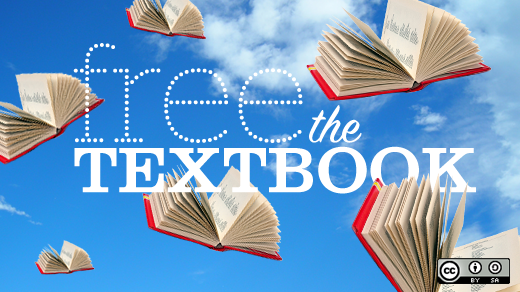
Panel Presentation on Open Textbooks: Siyaphumelela Conference 2022
Tony Lelliott
This image is shared under a Creative Commons license from opensourceway (CC BY-SA 2.0)
Open textbooks are an important phenomenon in the global higher education landscape with compelling affordances around cost savings and content development approaches that have the potential to address localisation and decolonisation of the curriculum. The four panel presentations at the 2022 Siyaphumelela Conference, also highlighted collaborative approaches to open textbook production that support innovative pedagogical practice and open new pathways for student co-creation.
The session commenced with a short video from BCcampus that explained the concept of Open Textbooks. Then moving onto four short presentations, Gino Fransman from Nelson Mandela University (NMU) discussed OpenEdInfluencers (OEIs) at NMU. OEIs are ambassadors that promote awareness of Open Educational Resources and Open Education Practices. To become an OEI, people enrol on a 6-module Becoming an Open Education Influencer course. Gino reported on a survey of students administered at NMU, highlighting the alarming finding that one third of students do not purchase textbooks at all, citing cost as the main limiting factor. To address this barrier to learning, the OEI programme has initiated an Open Textbook Fellowship to develop open textbooks, collaborating with the NMU library, curating resource-scarce modules and establishing an open content repository of resources.
Richard Sebastian from Achieving the Dream (ATD), an organisation focusing on transformation of the community college network across the USA, spoke about the OER degree and research initiative. ADT have found that enrolments on OER degree courses can lead to higher accumulation of credits, benefit students equally across race and socioeconomic status, and encourage collaboration across the institutions. ATD has also researched the nexus of Open Educational Practices and Culturally Responsive Education in eight colleges. The findings led to the development of a framework for Enacting Open & Culturally Responsive Practices consisting of five dimensions and five aspects of course presentation, thus:
The full report is available at www.achievingthedream.org/teaching-and-learning-with-OER-report
Glenda Cox and Michelle Willmers reported on the UCT Digital Open Textbooks for Development project (DOT4D), a three-year (2018–2021) research, advocacy and implementation project initially funded externally and now financed institutionally. Social justice drivers for the project included the need for free, accessible, localised, student-centred materials created collaboratively, including with student co-creation. They went on to describe key features of the open textbooks, student co-creation experiences, quality assurance approaches, and the introduction of the UCT Open Textbook Award. The initiative provided a total of ten grants, and seven of these produced either an entire textbook or chapters of a textbook. Examples were from Maths, Chemistry, Architecture, Statistics, Marketing, Orthopaedic Surgery and Computer Science. Anyone considering developing open textbooks would be well advised to read the experiences of academics who made the journey at UCT. The presentation closed with a look to the future, with ‘Students as partners’ in open textbook production to address the social injustices within their classrooms and higher education.
The last speaker, Tony Lelliott briefly described the work of the Saide OER Africa initiative with the current focus on working collaboratively to develop the professional competences and skills of stakeholders within African higher education institutions, so that they can implement OER practices to improve the quality of teaching and learning. He went on to note that open textbooks are not very common in developing country contexts as they can be difficult to produce without considerable resources available. He suggested that institutions, instead of creating open textbooks as a first step, might consider starting small by collating and curating OERs. This could be followed by developing open courseware modules, and then adopting and modifying existing Open Textbooks. He provided links to resources on open textbook adoption, adaptation and creation, and touched on ways of incorporating innovative learning design into OER production.
Questions discussed by panellists included:
- Are there any examples of student involvement/creation in open textbooks in science, maths or agriculture?
- Response: Two of the panellists responded in the affirmative: student involvement with assessment (Richard); examples from Year 1 and 2 Maths at UCT (Michelle).
- We know that producing open textbooks is not for the faint hearted. Are there any examples of how one might start?
- Response: In order to collaborate, institutions might find a common issue to address, e.g. curriculum transformation or mathematics education. It is important to consolidate efforts around challenges in the system and collaboration would be key to this (Michelle).
- How might you develop and foster linguistic coherence for multilingual textbooks in future studies?
- Response: DOT4D have examples from statistics and chemistry. Students assisted with translations of definitions of essential concepts into several languages (Glenda).
- There is a need for advocacy and empowerment of staff and students around the Open concept, for example some people think that eBooks are open (Gino).
- There is a need to encourage embedding of OER into course design. It may be that Siyaphumelela could include a service or a workstream which advocates and empowers institutions, as understanding the concept of Open is a paradigm shift for many. (Jenny)
- What about the quality of OER? Is there a framework to evaluate them?
- There are several: some are complex, while others are simple. OER Africa recommends using a simple framework to avoid getting bogged down in detail. One can also get students to carry out quality reviews of OER (Tony).

